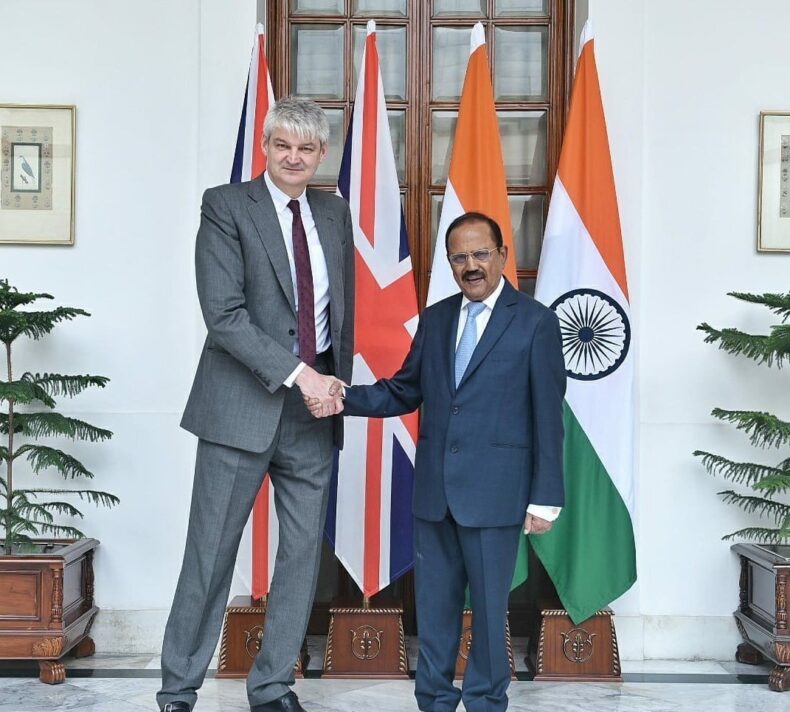India’s NSA Ajit Doval discussed regional security cooperation in Defence Sector with his UK counterpart Sir Stephen Lovegrove.
Ajit Doval, the National Security Adviser, met with his British counterpart, Sir Stephen Lovegrove, on Thursday. They discussed about a variety of issues that were important on both a bilateral and international level. See here.
https://twitter.com/UKinIndia/status/1550124940585644036
The emphasis was on concrete and significant results to advance the partnership in accordance with the objective of the India-UK Roadmap 2030.
The central issues covered were dealing with violent extremism as well as regional security, maritime and Indo-Pacific cooperation, and cybersecurity.
The NSAs discussed future-focused cooperation in the technology and defence areas with a focus on the following goals of the Atmanirbhar Bharat initiative, carrying forward discussions between the two Prime Ministers.
During their virtual summit in May 2021, Indian Prime Minister Narendra Modi and then UK PM Boris Johnson advanced the relationship between India and the UK to a Comprehensive Strategic Partnership.
At the summit, the two sides agreed and adopted a 10-year roadmap to strengthen their ties in trade and economics, security and defence, the environment, people-to-people exchanges, and other areas.
A 2030 Roadmap for India-UK Relations was also established by the agreement, which mainly outlines the partnership goals for the two countries’ relations.
Former UK PM Boris Johnson also disclosed that the UK is establishing an Open General Export License (OGEL) for India to “reduce bureaucracy and slash delivery times” for Defence procurement during his visit to Delhi in that month.
He further added that Britain would support India in the joint development of military hardware, including the domestic manufacture of fighter jets.
In the past, it had been impossible for both countries to pursue a rational relationship due to the bitter legacy of colonialism. However, in recent years, India and the United Kingdom have begun a constructive and pragmatist dialogue free of sentiment and resentment.
The outcome of a Comprehensive Strategic Partnership in 2021 is evidence that the India-UK relationship has been improving despite the challenge posed by the Ukraine crisis.
The current situation of India’s relations with the UK at the moment contrasts with the two countries’ ingrained pessimism regarding their future.
Under the supervision of India’s External Affairs Minister and his British counterpart, the two countries have been working on a blueprint to expand bilateral relations by 2030.
The first round of negotiations for an India-UK Free Trade Agreement was successfully concluded in January 2022 between India and the UK.
The United States plays a pivotal role in the transformation of India-United Kingdom relations. The United Kingdom shifted its attention away from India and toward recognition of India as a rising global power and a crucial partner in the Indo-Pacific.
The US was the first country to recognize India’s rapidly increasing relative importance in the global system. With the belief that a stronger India would advance US interests in Asia and the rest of the world, the US unveiled a policy of aiding India’s rise by the end of the 20th century.
For the US, the strategic commitment to assist India’s rise was rooted in the recognition of the dangers of a China-dominated Asia.
The UK is a regional power for India in the Indo-Pacific region as it has strategic naval bases in Kenya, Singapore, Bahrain, Oman, and the British Indian Ocean Territory.
In contrast to the US and France, who are dedicated to an “India first” strategy in South Asia, the UK is still torn between its renewed enthusiasm for India and the inertia of its historical leaning towards Pakistan.
After Brexit Britain must capitalize on its historic ties; having exited Europe, the country requires all collaborators it can find, and a rising India is inevitably one of the leading political and economic priorities.
Meanwhile, India has become supremely confident in dealing with the UK; with the Indian economy set to surpass Britain’s in the coming years, India is and will no longer be defensive in engaging Britain.













